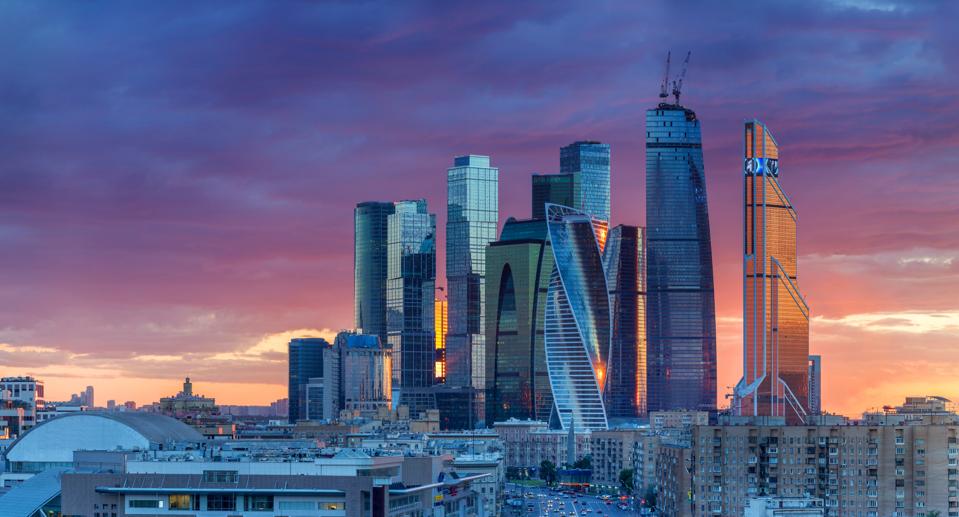
Moscow's International Financial Center. The city's leading ad and PR agency is being accused of ... [+]
GettyAnother year, another scandal involving major brand name firms and well-known investors. If they’re not in jail for alleged tax evasion and fraud, they’re probably being investigated for it.
The latest? BBDO Group in Moscow, which happens to be owned by Manhattan based (and publicly traded) Omnicom OMC .
Like many corporate scandals in Russia, it starts with an “insider”. A whistleblower named Nikolai Evgenievich Krasko sent a letter to the Russian version of the Internal Revenue Service, which was revealed by the government on November 26, saying “I have first-hand knowledge that that company specifically was used to illegally shelter over 3 billion rubles (around $45 million),” he wrote. He went on to list financial transactions dating from 2015 to 2019. None of them included New York-based Omnicom.
Krasko, who did not disclose his connection to BBDO in his note to the Federal Tax Service, said the transactions were “questionable” and were going to organizations that were “void of any business logic and clearly designed to funnel the money,” presumably out of Russia.
Because this is fairly commonplace in Russia, and involves a company with stocks listed on the NYSE, Moscow will consider this a juicy bone to gnaw on.
The Rosbalt News agency reported on December 7 that the Federal Tax Service received the November letter. They did not expand on any investigation timetable but suggested an investigation would occur by saying, “if violations of tax legislation are established, persons who have committed illegal actions will be held accountable for committing a tax offense on the grounds and in the manner prescribed by Russian tax laws.”
Russia is known for going after private sector enemies and using tax and other financial fraud, such as bribery, as a means to shut a business down. Or at the very least, remove the existing leadership of a company. Anytime Russian tax authorities are looking into a company, especially one with foreign interests, it has spelled doom. Bill Browder is arguably the poster child of this as former head of Hermitage Capital in Moscow.
MORE FOR YOU
When asked if they had heard about the allegations being made from Russia of a publicly traded U.S. firm, the Securities and Exchange Commission declined comment.
BBDO’s Moscow office, Omnicom’s press office in New York, and former Omnicom employees were contacted over the last week but did not return requests for comment.
News agency Rosbalt and Nezavisimaya Gazeta were the ones to bring this story to light as 2020 winds down.
Russia’s Federal Tax Service said last week that the investigation would eventually include the 11 Russian subsidiaries connected to BBDO going back to 2015.
BBDO Moscow is an important asset for Omnicom. It is Russia’s largest agency and placed some 22.6 billion rubles ($301 million) worth of ads and public relations work in 2019. Omnicom has a $13.9 billion market cap and is the second largest advertising and marketing group in the world after London’s WPP.
Worth noting, Russia tax investigations are a lot like American legal cases. Just as anyone can sue anyone for anything here in the U.S., Russia tax authorities are called upon to go after companies almost as often, and sometimes with dubious cause.
Still, since the fall of the Soviet Union in 1991, Russia has been a hotbed of money laundering, bribery and other financial schemes. The government has tried cracking down on them, hoping to keep money at home. Russia is still developing many years after the fall of communism, but when money flies out of the country and into Cyprus bank accounts, or London and New York real estate, for instance, it irks the local tax authorities who cannot afford such luxury.
BBDO Moscow traditionally represents U.S. corporate clients in Russia. BBDO Moscow also has a well-respected history of promoting Russian brands like Mobile TeleSystems, Russian luxury importer and store operator Mercury, tech firm Rambler and state-owned bank Sberbank.
Reports of the inquiry in the Russian press have suggested that there is some evidence of money being paid to phony “clients” — shell companies set up by BBDO Moscow managers to avoid paying taxes in Russia. Each of the 11 firms implicated in the scheme had only one employee, according to the complaint. Some firms receiving the money were registered at addresses with dozens of other companies.
BBDO could be a headache for Omnicom if they are roped into this.
If found guilty In Russia, BBDO executives could face jail time.
“When the tax authorities establish that the company has not paid taxes, this is not enough to initiate criminal proceedings,” Vladimir Postanyuk, of Postanyuk and Partners, told Rosbalt. “If the tax inspector, after conducting an audit, finds an understatement of the taxable base by several billion rubles, this may become the basis for a criminal case. You need to establish the fact of evasion first. Only then can we talk about the initiation of a criminal case,” he says.
Moscow’s white-collar criminal law enforcement agents have paid BBDO Group a visit at least once before, dating back to 2007. Some looked basic. Others more financially fishy.
According to Kommersant business daily, a 2007 inquiry into BBDO was carried out by the Department of Economic Crimes of Moscow in connection with an allegation that they were using pirated software. No charges were filed.
Russia: Better Next Year?

VanEck Russia in red. The ETF is up barely more than half a percent, underperforming the benchmark ... [+]
Yahoo! FinanceWell, the good news is that Russia (red line above) is doing way better than Omnicom (blue line), but is not even close to the MSCI Emerging Markets Index. Most of this is due to oil prices as Russia is still considered an oil and gas investment story.
The big picture investment story in 2020 was that Russian retail equity investors have become a significant force and will continue to be in 2021, scandals be damned. Russians are basically immune to those headwinds, unlike foreign investors who will often recoil from Russia risk. That risk aversion is a constant in Russian asset pricing.
For the locals, the number of broker accounts being opened in Russia has doubled over the last year, thanks to new technologies and decreasing deposit rates for savers. This trend will continue into 2021, opening the door to more IPOs like the recent e-commerce firm Ozon and paper and pulp firm Segezha up next, giving the Russian equity market the breadth it deserves. Next year will be another year where oil and gas is less of the Russian investment case.
Business and consumer demand is improving, though pandemic-related travel restrictions still have a significant negative impact on consumers. Russia’s travel sector has been hammered.
For example, Aeroflot shares priced in rubles are down over 31% year-to-date. Yandex YNDX ruble denominated shares are up over 90%.
Beyond new IPOs, a Russian retail investor looking beyond the noise, pent-up demand will push Russian stocks in line with the rest of the big emerging markets, says Denis Rodionov, Head of Research for SPRING in Moscow, an investment firm.
“This year was the year of growth stocks,” Rodionov says. “We believe 2021 may see rotation to value, and Russia – where a large share of the market is cyclicals and other deep value, rich-dividend stocks – may outperform.”
The Link LonkDecember 14, 2020 at 08:46PM
https://www.forbes.com/sites/kenrapoza/2020/12/14/moscow-hobbles-into-new-year-with-fresh-financial-scandal/
Moscow Hobbles Into New Year With Fresh Financial Scandal - Forbes
https://news.google.com/search?q=fresh&hl=en-US&gl=US&ceid=US:en

No comments:
Post a Comment